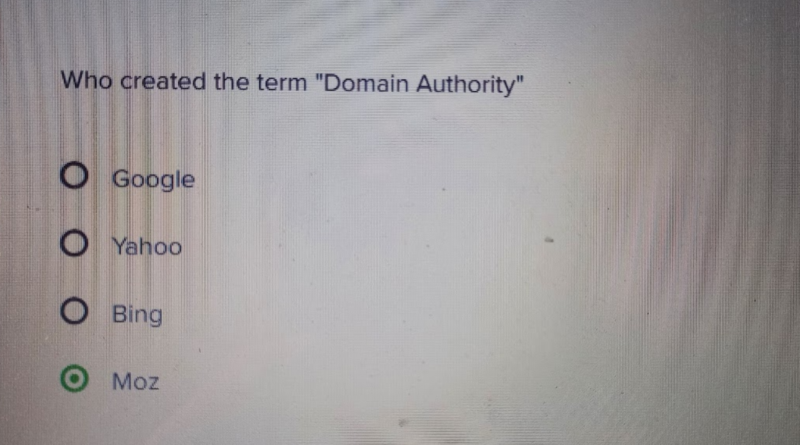Who created the term “Domain Authority”
Who created the term “Domain Authority”?
Option 1 – Google
Option 2 – Yahoo
Option 3 – Bing
Optiona – 4 Moz
Answer – Option 4
Moz
Explanation
The term “Domain Authority” was coined and developed by Moz, a well-known company in search engine optimization (SEO) and digital marketing. Moz introduced Domain Authority as a metric to estimate the strength and authority of a website domain in search engine rankings.
What is Domain Authority?
Domain Authority (DA) is a numerical score ranging from 0 to 100. It predicts how well a website will likely rank on search engine result pages (SERPs). Various factors, quality, and quantity of inbound links, the overall link profile, and other SEO-related signals affect DA.
Moz developed Domain Authority as a proprietary metric to help SEO professionals and web admins assess the relative authority of different websites and make informed decisions about link building, competitive analysis, and overall SEO strategies.
Domain Authority is specific to Moz and not an official metric used by search engines like Google. While Moz’s Domain Authority provide valuable insights and comparisons, search engines use their algorithms and ranking factors to determine search results.
Domain Authority is not an official metric used by search engines like Google, Yahoo, or Bing.
Google is the most widely used search engine and plays a significant role in search engine optimization (SEO). Optimizing your website for Google help improve its visibility, organic traffic, and overall performance in search engine rankings.
Yahoo
Like Google, Yahoo has a search engine and algorithm that determines search rankings. While Yahoo doesn’t explicitly provide a metric like Domain Authority, they consider various factors to assess the authority, relevance, and quality of websites in their search results.
Regarding SEO, the fundamental principles that apply to Google optimization also apply to Yahoo.
Bing
Bing is a search engine owned and operated by Microsoft. It is an alternative to Google and Yahoo search engines, providing search results and ranking algorithms. Bing aims to deliver relevant and diverse search results to users based on their search queries.
Regarding SEO considerations for Bing, similar principles apply as with other search engines.
While Bing, Yahoo, and Google have different search algorithms, many SEO best practices apply to both search engines. Therefore, implementing a well-rounded SEO strategy focusing on user experience, quality content, and following SEO guidelines benefit your website’s performance in Bing’s, Yahoo’s, or Google’s search results.
Key aspects of SEO
Crawling and Indexing
Google sends out automated programs called crawlers or spiders to discover and analyze web pages. These crawlers follow links to navigate and index web content. Ensuring your website is accessible, well-structured, and has a logical link structure helps Google’s crawlers discover and index your pages effectively.
Keyword Optimization
Google relies on keywords to understand the content and relevance of web pages. Conducting keyword research and strategically incorporating relevant keywords into your website’s content, titles, headings, and meta tags improve its chances of ranking well for relevant search queries. However, it’s essential to use keywords naturally and avoid keyword stuffing, as Bing, like other search engines, values content that reads well for users.
Quality Content
Every search engine emphasizes high-quality, relevant, and valuable content for its users. Creating informative, engaging, and unique content that satisfies user intent is crucial for ranking. Consider making comprehensive articles, blog posts, videos, or other media formats that address user needs and provide valuable information.
Mobile-Friendliness
With the increasing use of mobile devices, Google prioritizes mobile-friendly websites in its search results. Optimizing your website for mobile devices using responsive design, fast loading times, and mobile-friendly features ensures a better user experience and improves your chances of ranking.
Backlinks
Google, Bing, and Yahoo consider the quality and quantity of backlinks pointing to your website as a signal of its authority and relevance. Earning high-quality backlinks from reputable and relevant sources positively impacts your website’s visibility and authority in search results.
User Experience
Google, Bing, and Yahoo value websites that provide a positive user experience. Factors like page loading speed, site navigation, clear site structure, easy-to-use interface, and proper use of headings and tags contribute to a better user experience. Optimizing these aspects benefits your website’s SEO performance. A positive user experience through fast page loading times, easy navigation, and a well-structured website improves Yahoo’s rankings.
Social Signals
Bing considers social signals, such as social media shares and engagement, ranking factors. Building a solid presence on social media and encouraging social sharing of your content influence your website’s visibility in Bing.
Algorithm Updates
Google regularly updates its search algorithms to improve the quality of search results. Staying informed about algorithm updates, following SEO best practices, and avoiding spammy or black hat SEO techniques that violate Google’s guidelines are essential for long-term SEO success.
Remember, Google’s search algorithms are complex and consider numerous factors when determining rankings. It’s essential to have a holistic approach to SEO, focusing on providing value to users, following best practices, and staying up-to-date with the latest trends and guidelines from Google.
While Yahoo’s specific algorithms and ranking factors may differ from Google, following best practices in SEO, focusing on quality content and user experience, and building a solid online presence help improve your website’s performance in both search engines.
As of my knowledge cutoff in September 2021, Yahoo has transitioned its search results to be primarily powered by Microsoft Bing’s search engine through a partnership. However, the above principles still hold, as Bing’s search algorithm also considers similar factors in determining rankings.

